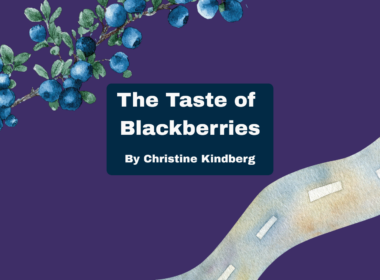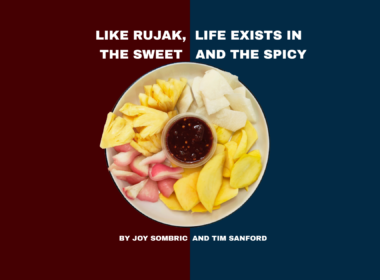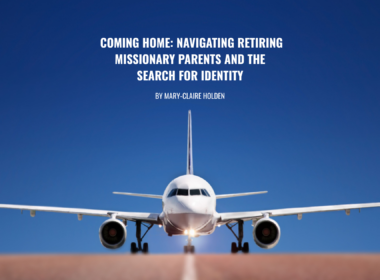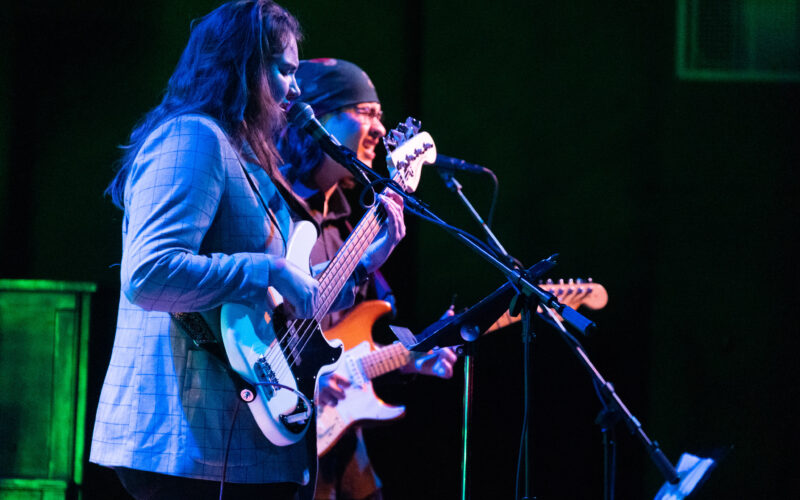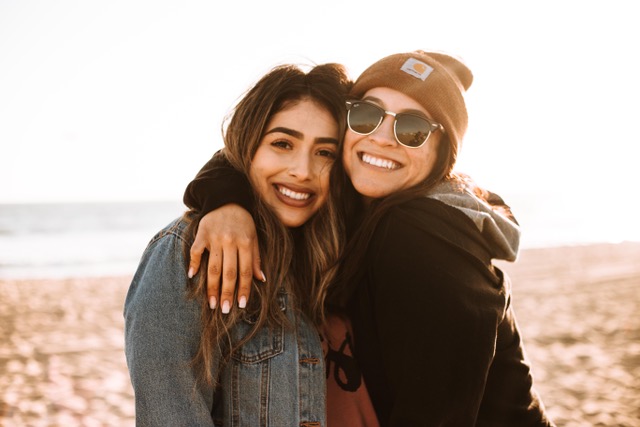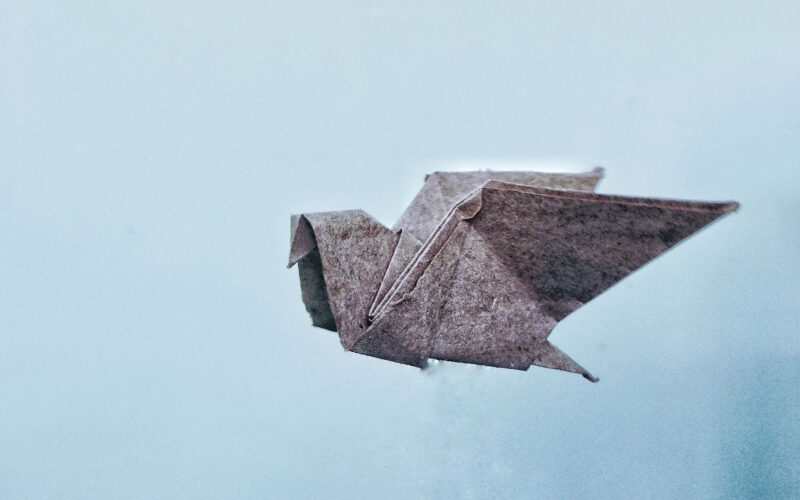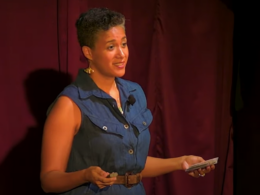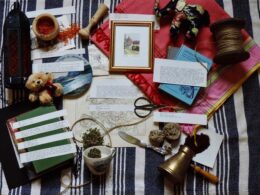TCK & Musician
For musician and TCK Maddie Thies, music has always been the current of her life. Growing up in Minnesota (US) and Seoul, South Korea, Maddie found creating music by herself and with others to be fulfilling and to help her process her identity as a TCK. After moving back to the US for college, she wrote songs by herself and also with other TCK friends, eventually breaking into the Minneapolis, Minnesota, music scene as a bassist— and even winning a creative award for a songwriting project based on her TCK experiences! Enjoy our conversation with Maddie, and then take a listen to her music, particularly her single, “Home Tonight.”
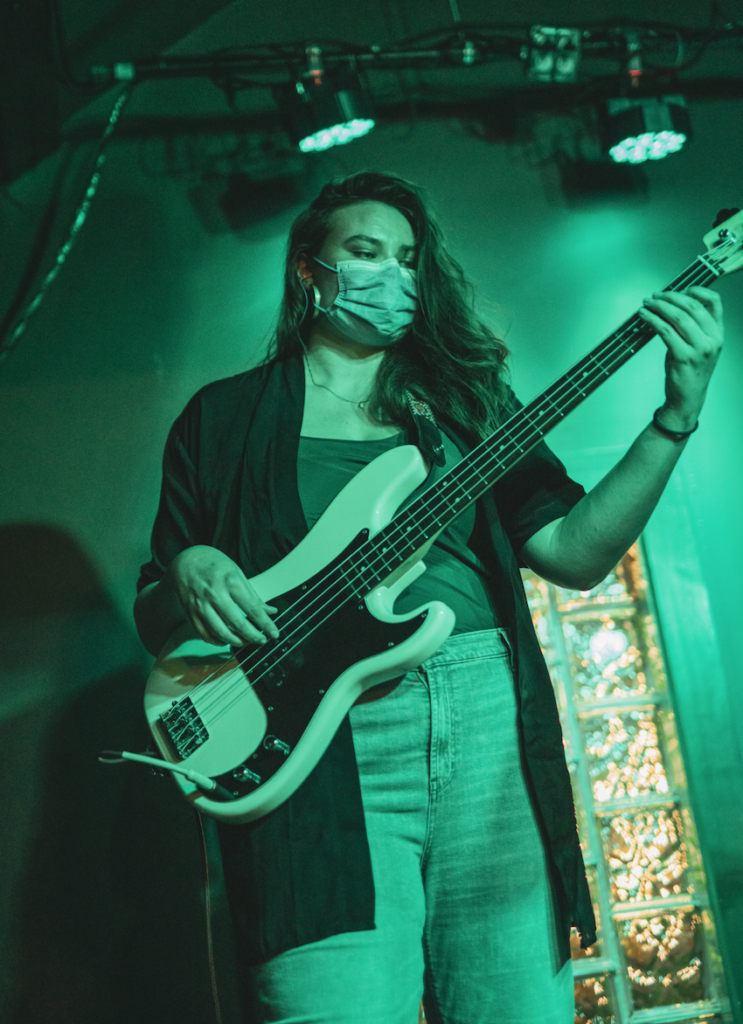
A performance shot of Maddie Thies playing bass in the Twin Cities, USA. Photo credit: Logan Chelmo.
It’s ironic how universal the feeling of being alone or misunderstood is.
Maddie Thies
Tell us a bit about your experience as a TCK.
What brought me overseas is actually a very funny and cute story. My parents had always wanted to work overseas or live a big adventure in some way and when they had me and my younger brother, that was kind of put on hold. We always traveled as a family—that was something that was very important to them. It wasn’t until the Pixar movie UP came out and the couple in the movie didn’t make it to Paradise Falls together that my parents walked out of that movie and thought to themselves, “We have to go and live our adventure before it’s too late.” At the time, I had only ever lived in Minneapolis, Minnesota (US).
It seemed like the very next day they had all the paperwork done, a month later they were at an international teacher job conference in Boston, and probably six months after that we were on a flight to Seoul, South Korea. I lived in Seoul from middle school all the way through high school, which isn’t as disjointed as many TCKs but I believe makes me all the more rooted in my TCK identity. So much of how I experience and move through the world has been incredibly influenced by growing up in Seoul. I moved back to Minnesota for college and it is where I currently reside, but nothing feels quite like home any more.
When did you discover that you were a TCK? When did you apply that label to yourself?
I think the “symptoms” of being a TCK hit me way before I realized that I even was a TCK. There was a summer when we came back to Minnesota that I reconnected with old friends, and I couldn’t quite put my finger on how I was feeling but I kept describing it as being “left out of an inside joke.” There was this nuance to my non-TCK friends’ existence that was effortless, rooted, and just very comfortable— it seemed like they always knew the answer to any question. For the longest time there was a lot of denying that the term even applied to me, even an amount of shame associated with it. I know now that I was a TCK from very early on, but I didn’t start to fully accept that term until I moved back to Minnesota for college and had such an incredibly hard time assimilating to American culture.
There was this nuance to my non-TCK friends’ existence that was effortless, rooted, and just very comfortable.
Maddie Thies
How and when did music become a part of your life?
Music has always been a part of my life. I started like most American kids with the Disney Classics song compilations, pre-school choirs, “Hot Cross Buns” on the recorder. I don’t know where I had seen a violin or got so attached to the idea, but I apparently begged my parents to let me play. They sent me to Ramsey International Fine Arts School (now known as Justice Page Middle School), which was one of the only public schools in the Twin Cities that had a full music program at the time. They started everyone on violin in the first grade there—and like any five-year-old on a new instrument, I was terrible. I switched to bass in the third grade thanks to the vision of my conductor, Patricia Kelley, and worked closely with conductor and bassist Stacy Aldrich. When we moved overseas, conductor and Head of Music Marion Statton truly nurtured me and provided every opportunity under the sun for me to play bass—and that is not an exaggeration.
I started my first band in high school, a little folk duo called “Northern Pinnacle,” with George Dornbach, a fellow TCK from Minnesota. Our bio used to read, “Both originally from Minneapolis, Minnesota, Maddie Thies and George Dornbach didn’t connect until moving halfway across the world to Seoul, South Korea.” This band really opened my eyes to writing music for myself and laid the foundation for my desire to create with like-minded folks.
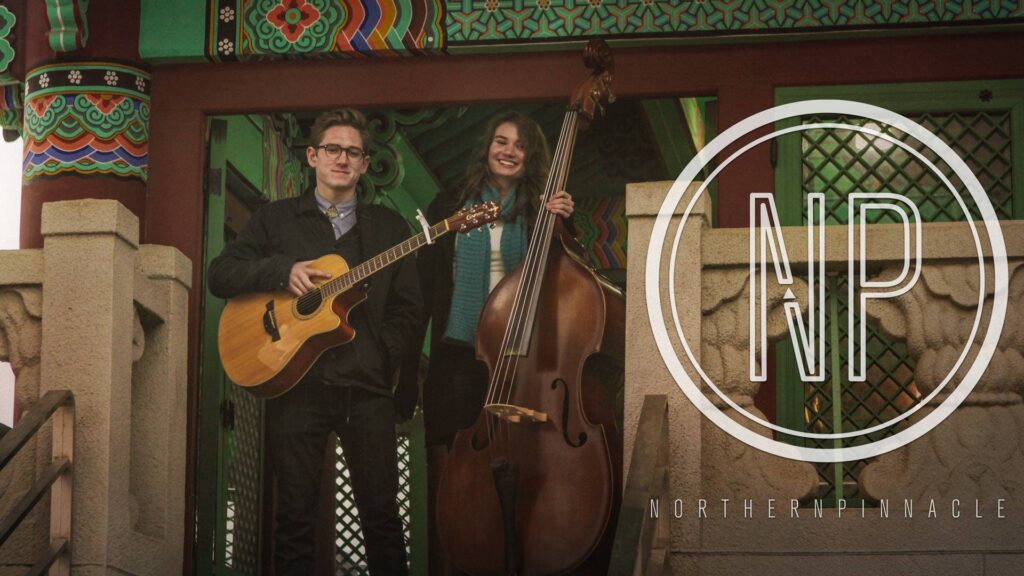
You recently won a Cedar Cultural Center Commission. Tell us about the project you created for that.
I was one of the 2021–2022 Cedar Cultural Center Commission winners. It is an award given annually to six up-and-coming musicians located in Minnesota to create a performance over the course of six months, performed at the end of that time. I have always been hyper aware of the lack of content about the TCK experience. Music is such an incredible outlet for finding commonality and community, and I was aware of how few artists were creating from a TCK perspective. I craved that niche corner of content and I was finding that the more I was writing, the more I was unable to disconnect my personal experience and world perspective from my writing. When I applied for The Cedar Commission, I knew that I wanted the TCK experience at the center of everything—the melodic concepts, lyrics, musicianship, everything. I titled the project “Everywhere and Nowhere” and described the set as one that “explores feelings of liminality, nostalgia, grief, culture shock, and a fractured sense of identity. The artists explore their fluid self-images through vulnerable storytelling, creating a space for personal reflection and empathy.” (See the project description at The Cedar Commission.)
I was aware of how few artists were creating from a TCK perspective.
Maddie Thies
I collaborated closely with Tate Egon Chavez, a fellow TCK and someone I met during my time in Seoul. We were double bass stand partners in an international youth orchestra through AMIS (The Association for Music in International Schools). Tate was born in Los Angeles and grew up in Singapore, but we met when AMIS was held in Brussels, Belgium. We had kept in touch loosely through social media over the decade that had passed since the last time we shared a stage together. Tate had been putting out music that was focused on concepts of belonging; between that and loving his musical style and voice, I knew even before applying that he was someone I had aspirations of creating with. We wrote closely over Zoom for five months leading up to the performance.
Just a week before the performance, Tate and drummer Juan Migues flew to Minneapolis and lived with me. Juan Migues is Uruguayan but has always lived abroad, mostly in Shanghai and in Seoul, where we met. We went to Seoul Foreign School together and played in what felt like every school ensemble together. We were joined locally by Kailyn Grider, a long-time friend and incredible guitarist. The four of us essentially lived and breathed the set. It was such an intense— and honestly, magical—week. During the first rehearsal I was moved to tears to be surrounded by understanding, friends, and such trust and musicianship. It’s a crazy thing to ask anyone to commit to but I also think it says a lot about TCKs—time and distance really aren’t deterring factors.
For the three days surrounding the actual performance, Tate’s sister and incredible Los Angeles filmmaker, Ana Chavez, joined us and documented the whole thing. When I put out my single, “Postcard Collection,” Ana made a music video for it using all of the footage.
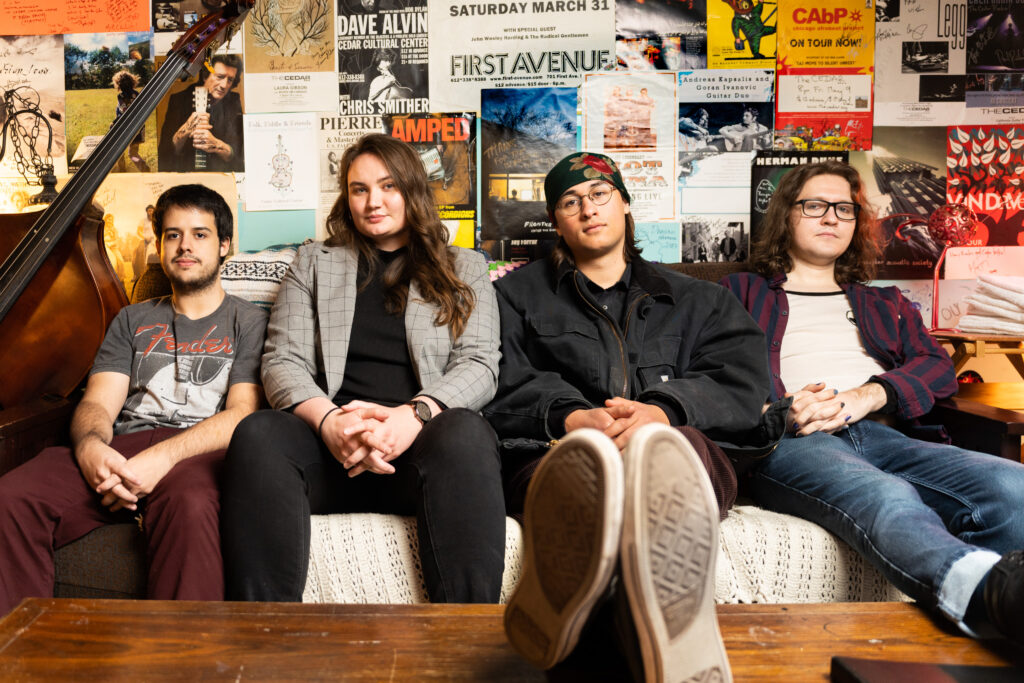
Photo credit: Darin Kamnetz.
Which original song is most meaningful to you as a TCK? Why?
My single, “Postcard Collection,” was honestly a pivotal moment for me. It was the first song I wrote for my commission and was the first time I let myself really lean into the full extent of my sound. Lyrically, it focuses on flashbulb memories and disorientation, tapping into a severe sense of liminality. Melodically, it’s textured and luscious and spiraling. The song itself encapsulates many profound memories from living in Seoul, but it also holds the additional memory of working so intensely on it during my commission. To have the added layer of the video made by Ana Chavez for it really makes it something I hold so close to my heart.
Additionally, “Home Tonight” is a song Tate Egon Chavez and I worked closely on together. This song stemmed from the classic “Where is home?” question that all TCKs get asked and never have an easy answer for. There is a deep desire for wanting that welcoming space, that feeling of being “home” and what that really means. The pre-chorus asks, “Is it a feeling? Or a place? Hardwood floors? Sweet embrace?” before the chorus answers, “Anywhere I go is home tonight.” It speaks on the adaptability, the nomadic qualities, the liminality of TCKs. We were able to capture this song specifically as a live one-take for NPR’s Tiny Desk Submission before everyone flew home after the performance.
Besides writing the lyrics of your songs, are there other ways that you’ve found to “work out” or process your TCK-ness? What helps?
Outside of creative spaces, I firmly believe that sharing space with other TCKs or folks who experience identity-splitting intersections is really the most beneficial way to process. It’s ironic how universal the feeling of being alone or misunderstood is.
How do you see your TCK-ness impacting your life today, either positively or negatively?
There are both positive and negative aspects to it. There is so much I love about my TCK identity. Above everything else, I believe it has made me a more empathetic person in every capacity. There will always be an aspect of it that is isolating. I always say that I am grateful for the love and understanding from those who get it, and for the people who don’t understand but love me all the more for it.
Have you struggled with or embraced the idea of “settling down” in one location? What does that look like for you?
I still don’t have a conclusion for this one. I like to joke that everything of importance to me could be put into two suitcases, with the exception of my dog and instruments. I have artwork that I have framed, but it’s all still on the floor just leaning against my wall… even though I have lived at my current location for almost four years now. I think I am always stuck somewhere in-between; there’s a deep respect, and maybe also a bit of a fear, that everything is temporary. It’s that same kind of anxiety about not wanting to waste a really good sticker on a water bottle or laptop cover, only intensified many times. Rationally, I know I can always repair any damage a nail can do and that art can travel with me… I do really love where I am right now. I don’t have any intentions to move at the moment but even in saying that just now, I do also always feel ready to go.
What do you wish you had known growing up as a TCK? What supports do you wish you had had access to?
I wish I hadn’t let myself acquire so much shame around my identity, like so many TCKs. I wish I also had been told to have more patience with myself when assimilating into cultures: moving back to America was incredibly hard. But I think I wish more than anything for the understanding and compassion from folks who don’t share the same experience.
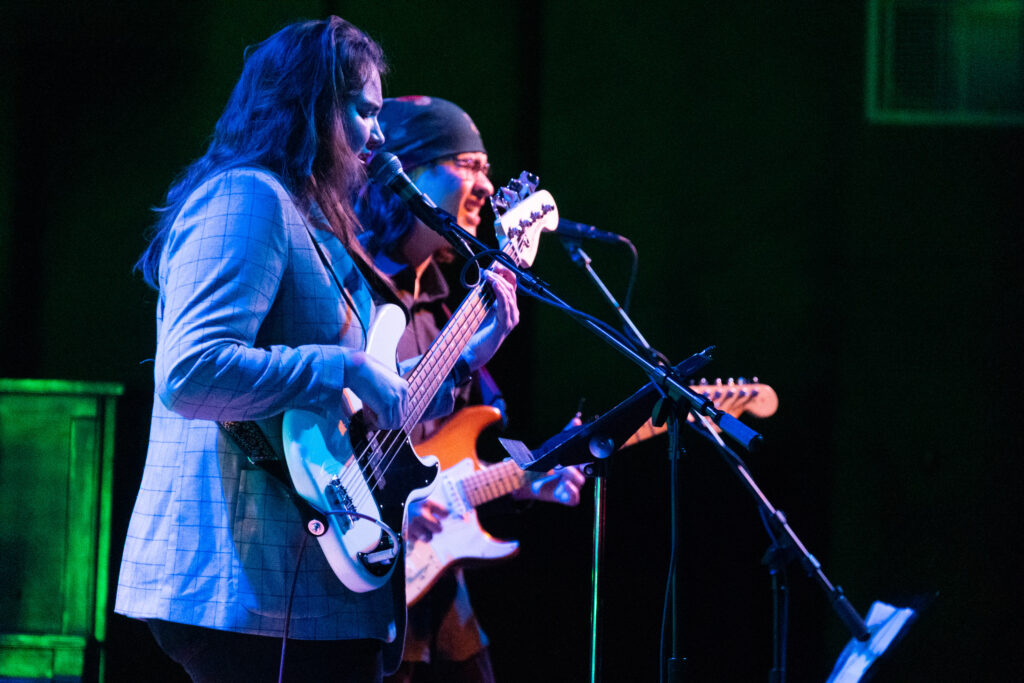
What’s on the horizon for you?
Since The Cedar Commission (a huge and forever thanks to them) my world has kind of opened up. I have found myself so richly saturated in the music scene here in the Twin Cities. 2022 was a year of deep reflection and intense creation; 2023 so far has been a year of motion and it looks like it will continue to be that way. I am so grateful to be trusted to share creative space with so many talented folks here. I don’t have anything specific to announce at this moment, but there absolutely will be more to come!


